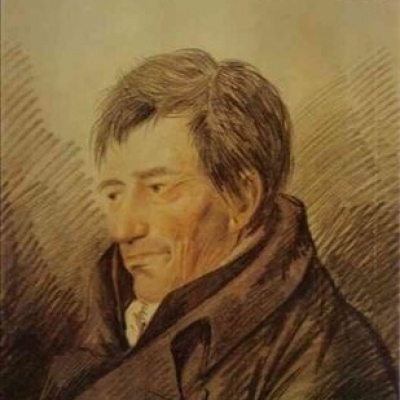
Muzio Clementi
Muzio Clementi (24 January 1752 – 10 March 1832) was an Italian-born English composer, pianist, pedagogue, conductor, music publisher, editor, and piano manufacturer. Born in Rome, he spent most of his life in England. Encouraged to study music by his father, he was sponsored as a young composer by Sir Peter Beckford who took him to England to advance his studies. Later, he toured Europe numerous times from his long-time base in London. It was on one of these occasions in 1781 that he engaged in a piano competition with Wolfgang Amadeus Mozart. Influenced by Domenico Scarlatti's harpsichord school and Haydn's classical school and by the stile galante of Johann Christian Bach and Ignazio Cirri, Clementi developed a fluent and technical legato style, which he passed on to a generation of pianists, including John Field, Johann Baptist Cramer, Ignaz Moscheles, Giacomo Meyerbeer, Friedrich Kalkbrenner, Johann Nepomuk Hummel and Carl Czerny. He was a notable influence on Ludwig van Beethoven. Clementi also produced and promoted his own brand of pianos and was a notable music publisher. Because of this activity, many compositions by Clementi's contemporaries and earlier artists have stayed in the repertoire. Though the European reputation of Muzio Clementi was second only to Joseph Haydn in his day, his reputation languished for much of the 19th and 20th centuries. Born shortly after Handel wrote his oratorio Jephtha and dead shortly after Berlioz wrote his Symphonie fantastique, Muzio Clementi failed to write anything equal to the originality of those two composers -- or, certainly, equal to the best of his closer contemporaries, Mozart and Haydn. Yet Clementi remains a significant figure for his pioneering work on behalf of the newfangled piano, that percussive, expressive instrument that quickly displaced the harpsichord at the end of the eighteenth century. His full-scale sonatas and small studies exploited the possibilities of the early piano and groomed the technique of early pianists, and led him to be known as "the father of the piano." His influence on Beethoven has likely been underestimated. Clementi was a child prodigy, with an appointment as an organist at age 9 and an oratorio to his credit by the time he was 12. In 1766 Clementi's father was persuaded to take the boy to study in England, the country that would remain Clementi's base for the rest of his life. In the English countryside the youth undertook a rigid course of studies, emerging in 1773 for a spectacular debut in London as a composer and pianist. Had Clementi matured anywhere else in Europe, he might have limited himself to the organ and harpsichord; but the piano was enormously popular in England, and Clementi furthered his career by capitalizing on the instrument's expanded capabilities. In 1780, he went on tour to the Continental capitals; in Vienna, Emperor Joseph II instigated a friendly musical duel between Clementi and Mozart. Clementi settled down in London in 1782, dividing his time between teaching (his pupils included Cramer, Meyerbeer, and Field), composing, and performing. In 1799, he co-founded a company that both published music and manufactured pianos. Toward the end of his life he traveled through Europe again and spent more and more time composing; during this time, he wrote several symphonies, but most have been lost. He is mainly remembered for his dozens of piano sonatas, and for his collection of studies, Gradus ad Parnassum (Steps Toward Parnassus), which has been the bane of piano students for two centuries and was parodied by Debussy in the opening movement of his Children's Corner. Clementi was the complete piano man, popularizing the instrument through his own performances, writing exercises to develop young pianists, writing sonatas for mature pianists to play, and manufacturing instruments for their use.
